- Home
- Jennifer Donnelly
A Northern Light Page 5
A Northern Light Read online
Page 5
"Soil's good. Dark and rich."
I looked down at it. It was as black as wet coffee grounds. "Yes, it is," I said.
"Should get a good crop out of it. Why you call your mule Pleasant? He's anything but."
"It's a misnomer," I said, pleased to be able to use my word of the day.
"You call your mule Miss? Miss Pleasant? It's a boy mule!"
"No, not 'Miss Pleasant,' misnomer. It means a misapplied name. Like when you call a fat person Slim. Misnomer. It comes from mesnommer, which is French—old French—for 'to misname.' It's my word of the day. I pick a word out of the dictionary every morning and memorize it and try to use it. It helps build vocabulary. I'm reading Jane Eyre right now and I hardly ever have to look up a word. Misnomer, though, that's a hard one to use in conversation, but then you asked about Pleasant and there it was! My perfect chance to..."
Royal gave me a look over his shoulder—a wincing, withering look—that made me feel like the biggest babbling blabberer in all of Herkimer County. I closed my mouth and wondered what it was girls like Belinda Becker had to say that made boys want to listen to them. I knew a lot of words—a lot more than Belinda, who giggled all the time and said things like "swell" and "chum" and "hopelessly dead broke"—but not the right ones. I kept my eyes on the narrows for a while, but that got to be boring, so I stared at Royal's backside. I had never really noticed a man's backside before. Pa didn't have one. It was as flat as a cracker. Mamma would tease him about it and he'd tell her the lumber bosses worked it off him. I thought Royal's was very nice. Round and proud like two loaves of soda bread. He turned around just then and I blushed. I wondered what Jane Eyre would have done, then realized Jane was English and proper and wouldn't have gone around eyeing Rochester's backside to begin with.
"Where's your pa, anyway?" Royal asked.
"With Daisy. Who's calving. And Abby. Who isn't. Calving, I mean." I wished I could stitch my mouth shut.
There were more questions. What was Pa using for fertilizer. How many acres was he going to clear. Was he planting any potatoes this spring. What about buckwheat. And wasn't it hard for him to run the farm alone.
"He's not alone. He has me," I said.
"But you're still in school, ain't you? Why aren't you out yet, anyway? School's for children and you're what ... fifteen?"
"Sixteen."
"Where's Lawton? Ain't he coming back?"
"You writing a column for the paper, Royal?" Lou asked.
Royal didn't laugh. I did, though. He was quiet after that. Two hours later, he'd finished the field entirely. We sat down for a rest, and I gave him a piece of the johnnycake I'd brought and poured him switchel from a stone jug. I gave pieces to Tommy and Lou and Beth as well.
Royal watched Tommy eat his piece. "Hubbards is always hungry, ain't they? Can't never seem to fill 'em up," he said. "Why you here, Tom?"
Tommy looked at his johnnycake, crumbly and yellow in his dirty hands. "Like to help Mattie, I guess. Like to help her pa."
"Whyn't you help your own mamma plow her field?"
"We ain't got a plow," Tommy mumbled, a red flush creeping up his neck.
"Guess you don't need one, do you? She's always got someone plowing her field, ain't she, Tom?"
"Cripes, Royal, what's Emmie's field to you?" I said, not liking the hard look in his eyes or the miserable, cornered one in Tommy's. The Loomis boys were always agitating with the Hubbards, like a pack of hounds after possums. Lawton had gotten between the younger ones and Tommy on many occasions.
Royal shrugged, then took a bite of his own cake. "This is good," he said. I was about to tell him that Abby made it, but then his honey-colored eyes were on me, not the johnnycake, and the hardness in them was gone and I didn't.
He looked at me closely, his head on an angle, and for a second I had the funniest feeling that he was going to open my jaws and look at my teeth or pick up my foot and rap the bottom of it. I heard a shout and saw Pa waving from the barn. He walked up to us and sat down. I gave him my glass of switchel. "Daisy had a bull calf," he said wearily, and then he smiled.
My pa was so handsome when he smiled, with his eyes as blue as cornflowers and his beautiful white teeth. He hardly did anymore, and it felt like a hard rain letting up. Like Mamma might come up from hanging wash and join us. Like Lawton might come out of the woods any second, his fishing pole over his shoulder.
Beth, Lou, and Tommy chased off to see the new calf. Pa finished the switchel and I poured him some more. Switchel is easier to drink than plain water when you are hot and thirsty. Mixing a little vinegar, ginger, and maple syrup into the water helps it to digest.
Pa looked at Royal, his shirt soaked with sweat, and my hands, dirty from the stones, and Pleasant unhitched, and put it all together. "I'm obliged to you," he said. "It's a son's work, planting. Not a daughter's. Thought I had a son to do it."
"Pa," I said quietly.
"Don't understand why he left. Couldn't tear me away from land like this," Royal said.
I bristled at that. I was angry at Lawton for leaving, too. But Royal was not family and therefore had no right to speak against him. Thing of it was, I didn't understand why my brother had left, either. I knew they'd had a fight, he and Pa. I saw them going at one another in the barn. First fists and then Pa had gone for his peavey. Then Lawton had run into the house, thrown his things into an old flour sack, and marched out again. I'd run after him. Me and Lou both, but Pa stopped us.
"Let him go," he'd said, blocking our way down the porch steps.
"But, Pa, you can't just let him walk out. It's the dead of winter," I pleaded. "Where's he going to go?"
"I said let him go! Go back in the house, go on!" He pushed us inside, slammed the door, and locked it, as if he were afraid we would leave, too. And afterward, he was so changed, it was as if we'd lost our father as well as our mother and brother. Some days later I asked him what the fight was about. But he wouldn't tell me, and from the anger in his eyes, I knew better than to press.
Royal and Pa talked farming for a bit and milk prices and who was building yet another camp on Fourth Lake or up the hill at Big Moose Lake and how many guests it would hold and how the market for cream and butter ought to go through the roof this season and why would anyone buy the slop that came up on the trains from Remsen when they could now get fresh milk right here.
Then Royal picked up his wagon wheel and said he had to get along to Burnap's. The iron tread was loose and George Burnap was the only one nearby with a forge. After he left, I thought I might get a talking-to for sitting and drinking switchel with him, but I didn't. Pa just gathered Pleasant's traces and walked him back to the barn, asking the mule if he had any idea why Frank Loomis had four good sons and he didn't have one.
som • nif • er • ous
"In the pantheon of great writers, of profound voices, Milton stands second only to Shakespeare," Miss Wilcox said, her boot heels making pok pok noises on the bare wood floor as she crossed and recrossed the room. "Now, of course one may argue that Donne deserves..."
"Pssst, Mattie! Mattie, look!"
I slid my eyes off the book I was sharing with Weaver, toward the desk to my left. Jim and Will Loomis had a spider on a piece of thread. They were letting it crawl back and forth on its leash, giggling like idiots. Bug taming was a Loomis specialty. First, Jim would pull a piece of thread from his shirt hem and painstakingly fashion it into a tiny noose. Then Will would snatch up a spider or a fly when Miss Wilcox's back was turned. He was quicker than Renfield in Bram Stoker's Dracula, though mercifully, he did not eat what he caught. He would hold his victim in cupped hands and shake it until it was stunned. Then as Will held the bug, Jim would slip the noose over its head. When the bug regained its senses, it became the star attraction in the Loomis Brothers Circus, which, depending on the time of year, might also feature a three-legged bullfrog, a half-dead crayfish, an orphaned blue jay, or a crippled squirrel.
I rolled my eyes. At sixteen I was
too old to be attending the Inlet Common School. The leaving age is fourteen, and most don't make it that far. But our old teacher, Miss Parrish, told Miss Wilcox about Weaver and myself before she left. She said that we were smart enough to earn high school diplomas and that it was a shame that we couldn't. The only high school in the area, though, was in Old Forge, a proper town ten miles south of Eagle Bay. It was too far to travel every day, especially in winter. We would have had to board with a family there during the week, and neither of us could afford to. Miss Wilcox said she would teach us the course work herself if we wanted to learn it, and she did. She had taught in a fancy girls' academy in New York City, and she knew plenty.
She had come to my house last November to talk with my parents about my getting a diploma. Mamma made us all wash before she came—even Pa—and had Abby make a gingerbread and me do the girls' hair. Mamma couldn't get downstairs that day, and Miss Wilcox had to go see her in her bedroom. I don't know what Miss Wilcox said to her, but after she left, Mamma told me I was to get my diploma even though Pa wanted me to leave school.
Weaver and I had spent most of the year preparing for our exit examinations. We were going to take the hardest ones—the Board of Regents—in English composition, literature, history, science, and mathematics. I was particularly worried about mathematics. Miss Wilcox did her best with algebra, but her heart wasn't in it. Weaver was good with it, though. Sometimes Miss Wilcox would just give him the teachers guide. He would puzzle through a problem, then explain it to me and Miss Wilcox.
The Columbia University is a serious and fearsome place, and a condition of Weaver's acceptance is that he earn B-pluses or better on all of his exams. He'd been studying hard, and so had I, but that day in the schoolhouse, struggling with Milton, I wasn't sure why I'd bothered. Weaver received his letter back in January, and though it was now the beginning of the second week of April, no letter had come for me.
Jim Loomis leaned over and dangled his spider right in my face. I jumped and swatted at it, which pleased him greatly. "You're going to get it," I mouthed at him, then tried to put my mind back on Paradise Lost, but it was hard going. Somniferous was my word of the day. It means sleep inducing, and it was a good one to describe that dull and endless poem. Milton meant to give us a glimpse of hell, Miss Wilcox said, and he succeeded. Hell was not the adamantine chains he wrote of, though. Nor was it the ever-burning sulphur, or the darkness visible. Hell was the realization that you are only on line 325 of Book One and there are eleven more books to go. Torture without end, all right. There was no place, of course, I would rather have been than in that schoolhouse, and nothing I would rather have done than read, read anything... but John Milton was a trial. What on earth did Miss Wilcox see in him? His Satan scared no one and seemed more like the Prince of Fusspots than the Prince of Hell, with all his ranting and carping and endless pontificating.
Fesole, Valdarno, Vallombrosa ... Where in blazes are those places? I wondered. Why couldn't Satan have decided to visit the North Woods? Old Forge, maybe, or even Eagle Bay. Why didn't he talk like real people did? With a cripes or a jeezum thrown in now and again. Why did little towns in Herkimer County never get a mention in anybody's book? Why was it always other places and other lives that mattered?
French Louis Seymour of the West Canada Creek, who knew how to survive all alone in a treacherous wilderness, and Mr. Alfred G. Vanderbilt of New York City and Raquette Lake, who was richer than God and traveled in his very own Pullman car, and Emmie Hubbard of the Uncas Road, who painted the most beautiful pictures when she was drunk and burned them in her woodstove when she was sober, were all ten times more interesting to me than Milton's devil or Austen's boy-crazy girls or that twitchy fool of Poe's who couldn't think of any place better to bury a body than under his own damn floor.
"And why do we read Shakespeare and Milton and Donne? Someone other than Miss Gokey, this time. Mr. Bouchard?" Miss Wilcox asked.
Mike Bouchard turned scarlet. "I don't know, ma'am."
"Throw caution to the wind, Mr. Bouchard. Hazard a guess."
"Because we have to, ma'am?"
"No, Mr. Bouchard, because it is a classic. And we must have a good, working acquaintance with the classics if we are to understand the works that follow them and progress in our own literary endeavors. Understanding literature is like building a house, Mr. Bouchard; you don't build the third story first, you start with a foundation..."
Miss Wilcox is from New York City. Up here, you didn't build the third story ever, unless you are rich like the Beckers or own three sawmills like my uncle Vernon.
"...where would Milton have been without Homer, Mr. James Loomis? And where would Mary Shelley have been without Milton, Mr. William Loomis? Why, without Milton, Victor Frankenstein's monster would never have been created..."
At the mere mention of that magic word Frankenstein, the Loomis boys straightened up. Jim got so excited, he let go of his new pet spider. It made for the edge of his desk and disappeared, trailing its leash. Miss Wilcox had promised since November that we'd read Frankenstein as our last book of the year, as long as everyone—meaning mainly Jim and Will—behaved. She had only to whisper the name Frankenstein, and they were suddenly as still and attentive as two altar boys. They loved the idea of stitching dead things together. They talked nonstop of finding frogs and toads to kill, just so they could bring them back to life again.
"...we read the classics to be inspired by the great thoughts of great minds...," Miss Wilcox continued, and then there was a sudden tinkling sound. She had dropped her bracelets again. Abby retrieved them for her. Miss Wilcox often fidgeted as she talked, taking her ring off and putting it back on, snapping chalk in her fingers, or sliding her bracelets off one wrist and onto the other. She was nothing like our old teacher, Miss Parrish. Miss Wilcox had curly auburn hair, and green eyes that I imagined must be the exact shade of an emerald, though I had never seen an emerald. She wore gold jewelry and the most beautiful clothes—tailored waists, fine worsted skirts, and cutaway jackets edged with silk braid. She always looked so odd in our plain schoolroom, with its rusty stove, plank walls, and yellowed map of the world. Like some precious jewel put in a battered old gift box.
After torturing us with a few more pages of Paradise Lost, Miss Wilcox finally finished the lesson and dismissed the class. Jim and Will Loomis tore out of the schoolhouse, cuffing Tommy Hubbard on their way, shouting, "Hubbard, Hubbard, nothing in your cupboard!" Mary Higby and I gathered up the half-dozen copies of the book that our class of twelve shared. Abby cleaned the chalkboard, and Lou collected the slates we'd used to do arithmetic earlier in the day.
I stacked the books I'd gathered on her desk and was ready to leave when she said, "Mattie, stay after, will you?" We were all "Mr." and "Miss" during class, but afterward she called us by our first names. I told Weaver and my sisters that I'd catch up. I thought maybe Miss Wilcox had a new book for me to borrow, but she didn't. As soon as the others were gone, she opened her desk, took out an envelope, and held it out to me. It was large and buff colored. It had my name on it. Typed on a label, not handwritten. It had a return address, too, and as soon as I saw what it was, my mouth went as dry as salt.
"Here, Mattie. Take it." I shook my head.
"Come on, you coward!" Miss Wilcox was smiling, but her voice was quavery.
I took it. Miss Wilcox drew an enameled case from her purse, pulled a cigarette from it, and lit it. My aunt Josie had told me and my sisters that Miss Wilcox was fast. Beth thought she meant the way our teacher drove her automobile, but I knew it had more to do with her smoking and having bobbed hair.
I stared at the letter, trying to find the courage I needed to open it. I heard Miss Wilcox's bracelets tinkle again. She was standing by her desk, cupping an elbow in her palm. "Come on, Mattie. Open it, for god's sake!" she said.
I took a deep breath and ripped the envelope open. There was a single sheet of paper inside clipped to my battered old composition book. "Dear Miss Gokey,"
it read. "It is with great pleasure that I write to inform you of your acceptance to Barnard College..."
"Mattie?"
"...furthermore, lam pleased to award you a fill Hayes scholarship sufficient to meet the cost of your first year's tuition, contingent upon the successful completion of your high school degree. This scholarship is renewable each year provided grade average and personal conduct remain above reproach..."
"Mattie!"
"...and, although your academic background lacks in certain aspects—notably foreign languages, advanced mathematics, and chemistry—your impressive literary strengths outweigh these deficiencies. Classes begin Monday, September 3. You will be required to report to orientation Saturday, September 1, and may address all questions regarding accommodations to Miss Jane Brownell in care of the college's Housing Office. With all best wishes, Dean Laura Drake Gill."
"Damn it, Mattie! What does it say?"
I looked at my teacher, barely able to breathe, much less speak. It says they want me, I thought. Barnard College wants me—Mattie Gokey from the Uncas Road in Eagle Bay. It says that the dean herself likes my stories and doesn't think they are morbid and dispiriting, and that professors, real professors with long black gowns and all sorts of fancy degrees, will teach me. It says I am smart, even if I can't make Pleasant mind and didn't salt the pork right. It says I can be something if I choose. Something more than a know-nothing farm girl with shit on her shoes.
"It says I'm accepted," I finally said. "And that I've got a scholarship. A full scholarship. As long as I pass my exams."
Miss Wilcox let out a whoop and hugged me. Good and hard. She took me by my arms and kissed my cheek, and I saw that her eyes were shiny. I didn't know why it meant so much to her that I'd got myself into college, but I was glad that it did.
"I knew you'd do it, Mattie! I knew that Laura Gill would see your talent. Those stories you sent were excellent! Didn't I tell you they were?" She twirled around in a circle, took a deep draw of her cigarette, and blew it all out. "Can you imagine?" she asked, laughing. "You're going to be a college student. You and Weaver both! This fall! In New York City, no less!"

 Rogue Wave
Rogue Wave Waterfire Saga, Book One: Deep Blue (A Waterfire Saga Novel)
Waterfire Saga, Book One: Deep Blue (A Waterfire Saga Novel)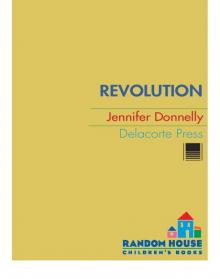 Revolution
Revolution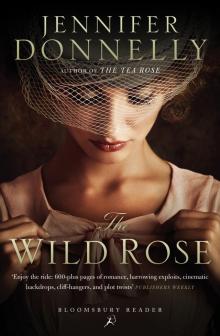 The Wild Rose
The Wild Rose Waterfire Saga (4 Book Series)
Waterfire Saga (4 Book Series)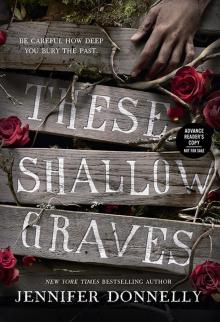 These Shallow Graves
These Shallow Graves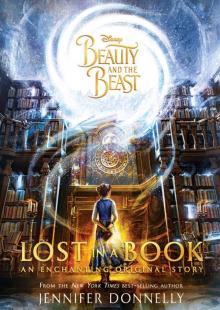 Beauty and the Beast: Lost in a Book
Beauty and the Beast: Lost in a Book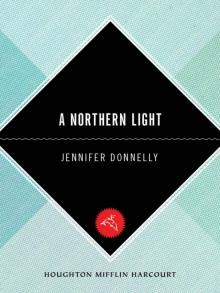 A Northern Light
A Northern Light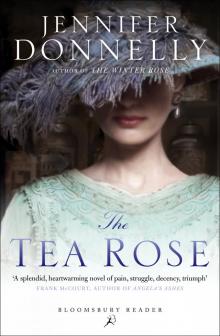 The Tea Rose
The Tea Rose Waterfire Saga, Book Three: Dark Tide: A Deep Blue Novel
Waterfire Saga, Book Three: Dark Tide: A Deep Blue Novel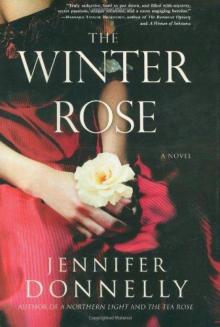 The Winter Rose
The Winter Rose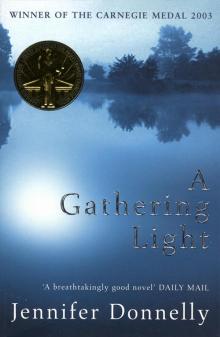 A Gathering Light
A Gathering Light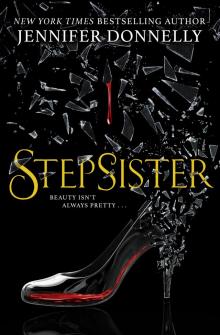 Stepsister
Stepsister Waterfire Saga, Book Four: Sea Spell: Deep Blue Novel, A
Waterfire Saga, Book Four: Sea Spell: Deep Blue Novel, A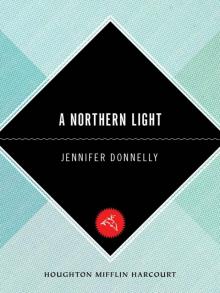 Northern Light
Northern Light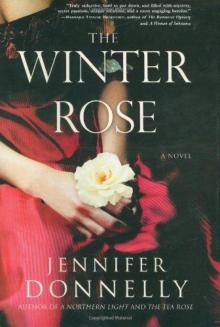 Winter Rose, The
Winter Rose, The